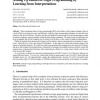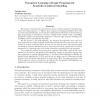53 search results - page 5 / 11 » A Logic Programming Framework for Learning by Imitation |
122
Voted
CORR
2000
Springer
15 years 1 months ago
2000
Springer
When comparing inductive logic programming (ILP) and attribute-value learning techniques, there is a trade-off between expressive power and efficiency. Inductive logic programming ...
153
click to vote
CORR
2011
Springer
14 years 5 months ago
2011
Springer
We propose a logical/mathematical framework for statistical parameter learning of parameterized logic programs, i.e. de
nite clause programs containing probabilistic facts with a ...
106
click to vote
EUROCOLT
1999
Springer
15 years 6 months ago
1999
Springer
The present paper motivates the study of mind change complexity for learning minimal models of length-bounded logic programs. It establishes ordinal mind change complexity bounds ...
ICRA
2006
IEEE
15 years 7 months ago
2006
IEEE
This paper presents an architecture for solving generically the problem of extracting the constraints of a given task in a programming by demonstration framework and the problem...
108
click to vote
ML
2006
ACM
15 years 1 months ago
2006
ACM
In this paper, we describe the syntax and semantics for a probabilistic relational language (PRL). PRL is a recasting of recent work in Probabilistic Relational Models (PRMs) into ...


